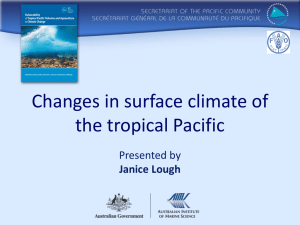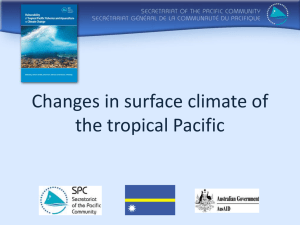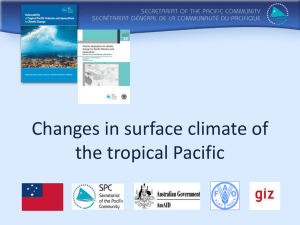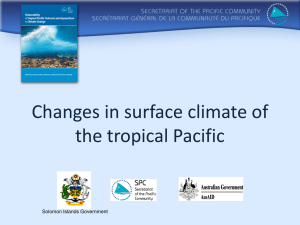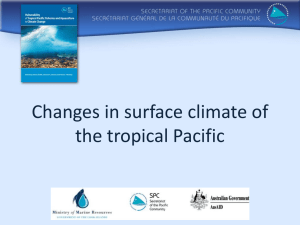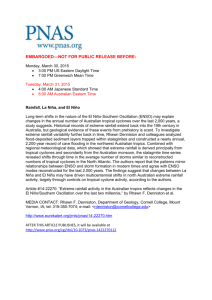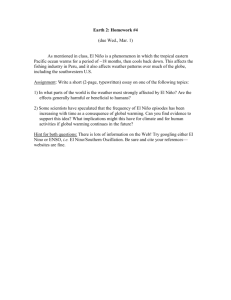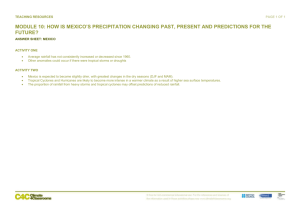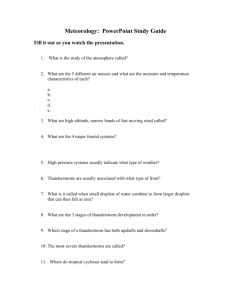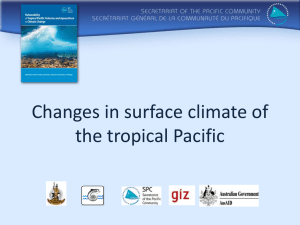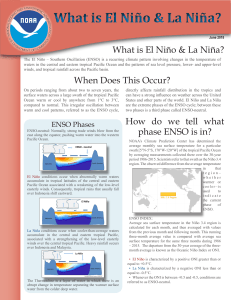Changes in surface climate of the tropical Pacific Janice Lough
advertisement
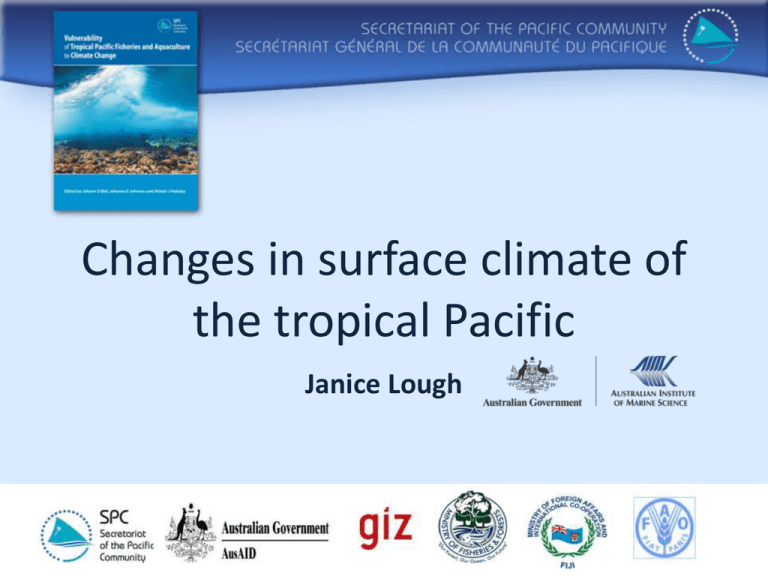
Changes in surface climate of the tropical Pacific Janice Lough History of human influence on climate: 1896 “A simple calculation shows that the temperature in the arctic regions would rise about 8o to 9oC, if the carbonic acid increased to 2.5 or 3 times its present value” S. Arrhenius Philosophical Magazine and Journal of Science 1896 (1903 Nobel Prize winner) CO2 290 ppm 0.7oC cooler20cm lower sea level0.1 higher ocean pH75% fewer people Key messages • • • • • • • We are all used to current climate and seasons Humans affecting climate system Climate is already changing Models imperfect but provide possible futures Future will be warmer Some places will be wetter and some drier Extreme weather likely to be more extreme Our climate will be changing for foreseeable future Redistributing sun’s energy = climate system Global annual mean energy budget W m-2 Trenberth et al 2009 • without atmosphere Earth ~30oC cooler • more greenhouse gases trap more energy in climate system Pacific atmospheric circulation • heat engine • ocean dominates island climates • trade winds • convergence zones • Fiji sensitive to SPCZ position • Walker and Hadley circulations Sea surface temperature climate Seasonal cycles: wind, rainfall, temperature Winds Rain Temperature Tropical cyclones: destructive weather events TC Jasmine Feb 12 2012 El Niño-Southern Oscillation (ENSO) • major source year-year climate variations • centred in tropical Pacific • evolves over 12-18 months • seasonal forecasts Typical El Niño and La Niña SST anomalies Warmer (red) or cooler (blue) Typical El Niño and La Niña rainfall anomalies Wetter (green) or drier (orange) ENSO shifts SPCZ and tropical cyclones El Niño • further north El Niño • further south La Niña • fewer cyclones further east El Niño • more cyclones further west La Niña La Niña Climate also varies on decadal timescales c 3 PDO index 2 1 0 -1 -2 -3 1871 1891 1911 1931 1951 1971 1991 Year • Pacific Decadal Oscillation (PDO) • cooler: SPCZ displaced SW & ENSO variability stronger • warmer: SPCZ displaced NE & ENSO variability weaker Results in average seasonal climate • what we expect = climate • includes variability (range) • what we get = weather Why are climate scientists so sure climate is changing due to human activities? • theory • modelling • evidence: instrumental measurements changes in the physical world changes in the biological world paleoclimate archives The climate system appears to be changing faster than earlier thought likely Steffen 2009 Measured increase in carbon dioxide 18th century = 280ppm air bubbles in ice cores 2011= 391ppm Mauna Loa Observed warming of global temperatures PCCSP 2011 Suva Observed warming of tropical oceans Projecting future climates Scenario IPCC-AR4 (2007) Low emissions (B1) High emissions (A2) Temperature (oC) CO2 (ppm) +1.8 (1.1-2.9) +3.4 (2.0-5.4) 450-500 750-800 • good observations • understanding of climate system • realistic models • predict future forcing – how much more greenhouse gases? • “downscaling” to scales that matter to us Range of possible futures Projected surface temperature warming • averages from several models • spatial difference in magnitude • the future will be WARMER Projected rainfall changes • wetter convergence zones • drier subtropics • more extreme wet years • more intense droughts Extremes The answer to the oft-asked question of whether an event is caused by climate change is that it is the wrong question All weather events are affected by climate change because the environment in which they occur is warmer and moister than it used to be Trenberth 2012 Preparing for TC Jasmine Vanuatu Possible new climates Temperature oC Now 2035 2050 2100 28.2 28.0 25.6 23.9 20.9 28.9 28.7 26.3 24.6 21.6 29.9 29.4 27.0 25.3 22.1 31.4 30.9 28.5 26.6 22.8 Rainfall mm Now 2035 2025 2100 Tarawa Funafuti Nadi Raratonga Pitcairn 725 1,160 785 425 380 780 800 1,250 835 1,340 900 490 320 Tarawa Funafuti Nadi Raratonga Pitcairn 460 350 Summary • future will be warmer • some islands wetter and some drier • maybe fewer but stronger tropical cyclones • more frequent and stronger extreme weather events • unclear how ENSO will change – continued influence • importance of RATE of change • not just a “new climate” to which we can adapt For foreseeable future climate will be CHANGING Challenge of staying below +2oC warming! Peters et al 2012 Thank you j.lough@aims.gov.au
